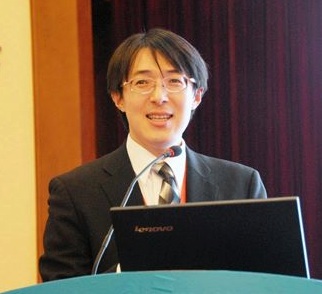Ph. D, Pharmacist (in Japan)
Professor in Pharmacognosy
Graduate School of Nagoya City University

| MAKINO Toshiaki Ph. D, Pharmacist (in Japan) Professor in Pharmacognosy Graduate School of Nagoya City University |
 |
| 1991-1995 | Undergraduate at Faculty of Phamaceutical Sciences, Kyoto University. |
| Awarded the degree of BS. | |
| 1995-2000 | Graduate student at Department of Pharmacognosy, Graduate School of Pharmaceutical Sciences, Kyoto University. |
| Awarded the degree of Ph.D. for a thesis entitled "Effect of Perilla frutescens on glomerulonephritis". Work was supervised by Prof. HONDA Gisho. |
|
| 2000-2005 | Assistant Professor, Department of Kampo Medicinal Sciences, Hokkaido College of Pharmacy, Otaru, Japan. Work was supervised by Prof. KANO Yoshihiro. |
| 2002-2003 | Visiting Scientist at National Center for Natural Products Research, University of Mississippi, USA. |
| 2005- |
Lecturer and Assistant Professor of Dept. of Pharmacognosy Graduate School of Nagoya City University |
| 2007- | Associate Professor of Dept. of Pharmacognosy Graduate School of Nagoya City University |
| 2014- | Professor of Dept. of Pharmacognosy Graduate School of Nagoya City University |
Research Interest
Pharmaceutical Science for Kampo Medicine
Kampo Medicine is the traditional Japanese medicine, which supports the patient's homeostasis to improve the body constitution and treat the chronic diseases. In order to make modern scientific evidences for the Kampo medicine, it is not enough to conduct modern pharmacological approaches that can reveal only its symptomatic effect. We try to develop more physiological disease models in animal experiences to clarify the original pharmacological effects of Kampo medicine.
--- Change of traditional pharmacology of licorice by heat-processing.
--- Processed aconite root and its active ingredient neoline alleviate oxaliplatin-induced peripheral neuropathic pain.
--- Effect of ninjin’yoeito and ginseng extracts on oxaliplatin-induced neuropathic pain.
--- Protective effecrt of shichimotsukokato on chronic kidney diseases.
--- Role of mineral crude drugs in byakkokakeishito.
--- Anti-allergic effects of shoseiryuto and the role of each prescrived herbal drug.
Clinical Pharmacognosy, Clinical Kampo Pharmacology
Now in Japan, more than 70% of M.D.s use Kampo medicine in their clinical treatment, and 80% of citizens use dietary supplements in their self medication. For Japanese pharmacists, there are not enough drug information for these medicinal herbs, and the studies about clinical pharmacy for medicinal herbs are earnestly demanded. However, these studies are usually conducted by the scientists in clinical pharmacy, who sometimes do not have knowledges for pharmacognosy. We try to develop clinical pharmacy about pharmacognosy, named clinical pharmacognosy, in order to support pharmacists and physicians who manage medicinal herbs.
--- Interactions between Kampo medicines and western medicines.
--- Mechanisms of the adverse effect of Kampo medicines - licorice-induced pseudoaldsteronism.
Pharmacognosy
The term "Pharmacognosy" is not natural products chemistry to develop new chemical drugs but MATERIA MEDICA for natural medicines. The quality control for medicinal herbs are very important works for pharmacognists because now herbs used as dietary supplements are usually worse than medicinal herbs regulated as drugs by the goverments. We try to develope new approaches to regulate medicinal herbs in the market.
--- The differences of of byakujutsu (Atractylodes rhizome) and sojutsu (Atractylodes lancea rhizome).
--- Review of the efficiencies of crude drugs used in Kampo meedicine. (In Japanese)
--- History for the usage of herbal medicine in the United States shown in the successive pharmacopoeia. (In Japanese)
--- The difference of quality between coenzyme Q10 preparations of dietary supplement available in Japanese market (In Japanese)
Honors and Awards
| 2004 | Encouraging Award from The Hokkaido Area Chapter of The Pharmaceutical Society of Japan |
| 2005 | Encouraging Award for the Research of Kampo Medicine from Iskra Industry Group |
| 2009 | Encouraging Award of Japanese Society of Pharmacognosy |
| 2009 | Yasue Award of Tokai Society of Kampo Dermatology |
| 2013 | Encouraging Award of Japanese Society of Oriental Medicine |
| 2017 | Contributing Award of the Society of Medical and Pharmaceutical Society for WAKAN-YAKU |
| 2020 | Contributing Award of Japanese Society of Pharmacognosy |